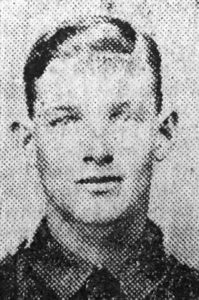Horace Fenton
Horace Fenton from Long Bennington enlisted in Grantham in Jan 1917 and was then drafted to 2nd/5th Battalion, South Staffordshire Regiment at Rugeley Camp.
In late September 1917 the battalion took part in the Battle of Polygon Wood, part of the 3rd Ypres (Passchendaele) campaign. On the night of 25th they moved up from trenches south of WEILTJE in single file and formed up along the line in ZEVENCOTE where tapes had been previously laid out.
At 05.50am on Wednesday 26th Sep, after a 2 hour bombardment, the troops moved forward, 150yds behind a creeping barrage. They soon captured their objective, taking about 50 German prisoners and then consolidated their position. They were heavily shelled throughout the day and the Germans counter-attacked in the late afternoon. They held the captured position but Horace Fenton was one of those killed during the day. He has no known grave but is commemorated on the Tyne Cot Memorial.
His parents were Joseph Fenton, a chimney sweep born in Newark, and Mary (nee Purnell) born Grantham. In 1891 the couple were living in Priests Yard, Newark, close to Mary’s parents in Chatham St (off Albert St). Joseph and Mary later moved from Newark to Back Lane, Long Bennington.
In 1897 Joseph was accused of stealing a ring and money from William Dolby’s clothes while they were both swimming in the Witham. Police found Mary wearing the missing ring and John Kirton reported seeing Fenton going through Dolby’s clothes, but Fenton claimed it was a practical joke and was acquitted.
In July 1931 Joseph and another son (Alec Parnell Fenton) were involved in an affray in front of the Wheat Sheaf Inn. Alec had been ‘singling’ sugar beet on peace rates for Leonard Thompson at Fen Farm; but when he failed to complete the work satisfactorily the farmer withheld 12/ from his wagers. Thompson had been to the Wheatsheaf to see Mr Dring, the blacksmith (his wife ran the inn). He claimed that Joseph punched him in the face before encouraging Alec to join in, cheered on by other members of the family. The father and son gave a very different account of the fight, but were found guilty and fined £10 each plus costs.
Mary died in 1938.
